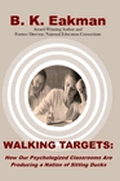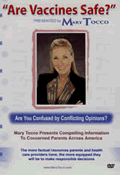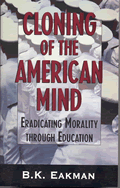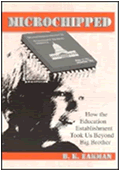HIGH-TECH MARXISM COMES TO AMERICA
by Beverly Eakman
January 13, 2009
NewsWithViews.com
Deep down, most Americans once thought they were immune from blatant propaganda, government-sanctioned media-bias and psychiatric hospitals-cum-prisons — hallmarks of Adolf Hitler’s Third Reich and Josef Stalin’s Communism. Such confidence is shifting as folks increasingly fear speaking their mind — on schools campuses, on the job, in houses of worship and public places. Worse, a metastasizing mental health industry has convinced government leaders that “nonprofessionals” — especially parents — are unqualified to make decisions on behalf of children. Average Americans find themselves intimidated by bureaucracies ranging from Child Protective Services to universities to the Environmental Protection Agency. These are just three agencies steeped in a deep-rooted presumption of citizen incompetence — precisely opposite the view of American Founders like Thomas Jefferson and James Madison. Today’s national leaders, agency heads and mainstream reporters are mostly hostile to American idealism, Christian morality and Western culture, which have taken the hardest hits under the banner of political correctness.
TV sitcoms, women’s magazines, and much of what passes for news daily prove that traditional notions of integrity and decency are in their death throes, while psychology (despite its dismal track record) is promoted as being firmly anchored in “science,” just as it was under Adolf Hitler and Josef Stalin. The difference today — thanks to exponential advances in computer cross-matching, identification and tracking — is that politically incorrect “troublemakers” can be identified and marginalized before they secure careers involving leadership, status or influence. That, of course, is always the end-game of campaigns in political correctness.
The Forty-Five Year “Leap Forward”
Just as in Mao Tse-tung’s “Great Leap Forward” (a.k.a. “cultural revolution”), during which millions were murdered, the current state of affairs in America did not emerge suddenly. There were abundant warnings. Many writers, myself included, penned well-read works signaling a multitude of subtle twists and turns which our government, together with special interests, had undertaken since World War II in pursuit of, first, a socialist America, and then a totalitarian Superstate.
For some reason, Americans resist ominous signs. Perhaps it is because this nation was founded upon optimism, not created out of desperation. The earliest immigrants to our shores left everything familiar to institutionalize a different sort of governing style, one in which individuals were important instead of being servants of the State. This was a huge departure from prior ideas about the relationship of government to the governed. Modern citizens have pretty much lost touch with the radical nature of that single step.
The “Mouse” That Morphed
Today’s schools, of course, barely touch on anything about the early values, philosophies or ideals that formed the “America” of the 17th, 18th and 19th centuries. This is not surprising. Every “wannabe” tyrant that ever existed has always tried to wipe out knowledge about a nation’s past, or recast it to reflect “new” thinking. Today’s elites and special interests are no different — except for one thing: the computer. Sophisticated mathematical models and data-collection techniques make it possible, with the click of a “mouse,” to know which people are “buying in” to the incessant flow of disinformation and which citizens are not. Those who are not “buying” are “resisters.” Those who do “buy” are accepted into the better colleges, obtain the influential jobs and enjoy “status.”
Within the space of 30 years, computer giants had perfected software and hardware packages that gave the public — and, more importantly, its overseers — “what they wanted.” (For step-by-step details of data-collection and tracking, see Educating for the New World Order, 1991 and its sequel, Microchipped, 1994, Halcyon House Publishers). Meanwhile, a silent revolution was taking place in the media. The so-called “mainstream” sources — and both major political parties — started engaging in turf battles, which meant, basically, ignoring any “competitor” who might be saying something a little different. Nobody wanted to lose funding to somebody else. This resulted in fewer forums for real whistleblowers, and less dissemination of ideas. Despite the conveniences of the Internet, average people found it necessary to become proactive in obtaining their news. They couldn’t rely on any of the old standbys. Even libraries and bookstores displayed “preferred” books and magazines prominently (for money, of course) and relegated everything else to the back wall or to “special order.” Consequently, one had to know beforehand what to ask for. Americans had to sleuth around in a way they never did previously.
Most people thought they had more pressing priorities.
Schools: The Primary Aggressor in the War Against America
The National Education Association (NEA) became a primary aggressor in the war against parents, religion and national sovereignty during the post-war period, beginning with its landmark publication, Toward World Understanding and its co-founding of UNESCO (the United Nations Educational, Scientific and Cultural Organization, co-founded in 1947 with a grant from the NEA and the Carnegie Foundation for the Advancement of Teaching). Passing itself off as a “professional teacher’s organization,” the NEA’s leftist leadership lured educators by offering incentives like insurance and retirement benefits, then proceeded to create proxies to infiltrate teachers’ colleges and dictate weird accreditation standards. The orthodoxy of parental incompetence began pervading teacher-preparation programs. Politicians were neutralized as they came to fear loss of NEA support more than loss of American principles. Other institutions and corporations soon fell into step. The new supercomputers introduced features most people had ever heard of in a pre-personal-computer world. In 25 years, the era of psychological dossier-building was a done deed (see Chapter 3, “Taking a Ride on the SPEEDE-ExPRESS,” in my 1998, award-winning book, Cloning of the American Mind, available from the NewsWithViews.com bookstore. Note: Book out of print, supply is limited). Analysts with concurrent degrees in psychology and statistics sealed the deal.
Today, children are “empowered” — blatantly encouraged to circumvent their parents and defy traditional values. Unfortunately, their “empowerment” had more to do with creating chaos and a vigorous data-collection effort than with self-determination.
Applying Marxist Terminologies to Psychological Profiling Programs
The 1995 Texas Medication Algorithm Project (TMAP), inaugurated in Texas (and funded by the leftist Robert Wood Johnson Foundation) under then-Governor George W. Bush, morphed into a congressionally funded universal mental-health screening program and psychotropic drug-treatment plan encompassing some 25 federal agencies by 2004. This would enable a future administration (incoming President Barack Obama?) to enforce psychological profiling (and mandatory drugging, if “necessary”) on every man, woman and toddler under an umbrella of “security.” Today, TMAP goes by the Marxist-like moniker “New Freedom Initiative” and is linked directly to political correctness. A quiet campaign of coercion, hidden amongst computerized records collected over two decades was launched. Today, the Powers That Be can access and merge information about you, “flag” anything that might prove damaging to you down the road (should you become a “refusenik”), while simultaneously editing out anything positive, and relegating it, in effect, to the cutting-room floor. How would anyone know, after all?
Among the first hints that such atrocities were under construction occurred in 1973. Parents in Pennsylvania got wind of intimate questions being included on a standardized achievement test. The “test” supposedly required parental consent and voluntary participation, but complied with neither directive. These parents called in the American Civil Liberties Union. The case was settled out of court in favor of the complainants. The Chief of Pennsylvania’s Department of Testing was told that if he henceforth would agree to adhere to a policy of voluntary participation and provide notification, then charges would be dropped.
But a decade later, the old U.S. Office of Education took on cabinet-level status as the U.S. Department of Education. Its state clones, called “state education agencies,” decided that such admonitions could be safely ignored. An avalanche of what-would-you-do-if queries and word-association games passed off as legitimate test items were disseminated to 120,000 students in the 5th, 8th and 11th grades through Pennsylvania’s Educational Quality Assessment (EQA). Irate parents were shuffled between the local, state and federal bureaucracies, each of which blamed the other. When Pennsylvania’s Division of Testing took the fall (again) — this time for linking curriculum directly to the tests, renamed “assessments,” as well as for failing to give notice — politicians dithered. It turned out that the money trail for both the assessments and the “remediating” curriculums (bearing the EQA logo right on the covers) led back to the federal government, through salaries and the Elementary and Secondary Education Act of 1965.
The whistleblowers were already too late.
Self-Reports and Intimate Revelations
Soon, copycat EQA’s started turning up in other states, with such “test” questions as:
I often wish I were someone else. [or] I get upset easily at home. [a] Very true of me, [b] Mostly true of me, [c] Mostly untrue of me, [d] Very untrue of me.
You are asked to dinner at the home of a classmate having a religion [or race] different from yours. In this situation I would feel: [a] Very comfortable, [b] Comfortable, [c] Slightly uncomfortable, [d] Very uncomfortable.
A group of people are standing on a street corner. Some pick up rocks and start throwing them at windows. I WOULD ALSO THROW ROCKS when I knew… [a] there was no chance of getting caught; [b] I agreed with what they were protesting about; [c] my friends decided to throw rocks.
Individual classes weren’t immune from these computerized assessments, either. A Nebraska Adolescent “Health” Survey asked high-schoolers whether they considered themselves “religious” and what they thought about when they thought of sex! By May 2004, 194-question-long surveys like the one given to 11th-graders at the Tucson Unified School District were cropping up, featuring True-False queries like:
• I consider myself outgoing and spontaneous.
• I consider myself basically quiet and shy.
• I consider myself able to persuade my peers that my opinion is correct.
• My parents feel they should make a significant contribution of time and energy to society.
• I feel individuals identified as gifted experience more problems than individuals not [so] identified.
Typically, there were just enough real academic questions to appear credible. But the truth was usually found in the scoring literature — the kind of professional material that is still off-limits to laypersons. On the EQA, it explained how points were given for a “minimum positive attitude” (in the opinion of behavioral psychologists, not necessarily parents). The rationale? Assessment creators stated they were testing not for academics, but for a student’s “locus of control;” his/her “willingness to receive stimuli;” “amenability to change;” and for inclination to “conform to group goals.” Thus, kids were getting points for responses that showed a willingness to conform to the group — one of the New Ethics that precludes both individualism and a Christian worldview.
The implications were staggering. Pupils were being tested on whether they would be “team players” instead of individual thinkers (much less “critical thinkers”), and whether they would be acquiescent instead of principled. Today, these kinds of “tests” pervade even job applications.
“Like a Rolling Stone” — or an Atom Bomb
Eventually, test creators became so good at devising questions that the “target subjects” — children or adults — were generally unaware just how much they were divulging. Surreptitious identification mechanisms improved, too: “slugging,” “bar-coding,” “sticky-labeling,” “embedded identifiers.” (see Dec. 2008 Speech of the Month by Beverly Eakman, including PowerPoint presentation with evidence, in Vital Speeches of the Day, #563). According to two of the premier behavioral test constructors, the late Ralph Tyler and Richard Wolf, the goal is “to outwit the subject so that he cannot guess what information he is revealing.”
Cecil Golden, Associate Commissioner of Education in Florida, put it to The Ledger this way in July 1972: “…like those assembling an atom bomb, very few of them [software designers] understand what they’re building, and won’t until we put all the parts together.”
Today, professional opinion molders understand it just fine, as do educational leaders and many Members of Congress. And after the Obama Administration? Well, let’s just say that America, by that time, will look a whole lot less “like a rolling stone” — the song that came to define the Baby Boomers’ free-spirited rebelliousness of the 1960’s — and more like “the atom bomb” of Cecil Golden’s prophetic nightmare.
That’s “change” you can bank on!
Related
Article:
Communist
(Community) Oriented Policing
� 2009 Beverly Eakman - All Rights Reserved
Sign
Up For Free E-Mail Alerts
E-Mails are used strictly for NWVs
alerts, not for sale
Beverly K. Eakman is a former speechwriter for the Voice of America (under the U.S. Information Agency) as well as for the late Chief Justice Warren E. Burger when he chaired the Commission of the Bicentennial of the U.S. Constitution, and then a writer for the U.S. Dept. of Justice. Since retiring from the federal government, she has won numerous awards and is a sought-after speaker and lecturer.
She is the author of three best-selling books on education policy, mental-health issues and data-trafficking. She is a free-lance columnist with dozens of feature articles in hard-cover publications to her credit. She began her career as a teacher, where she first got wind, in the 1960’s and 70’s, of what was about to happen to classrooms nationwide. Her writings citing that period are considered historically important today and have earned her nationwide recognition.
She can be reached through her website:
Website: BeverlyE.com


















